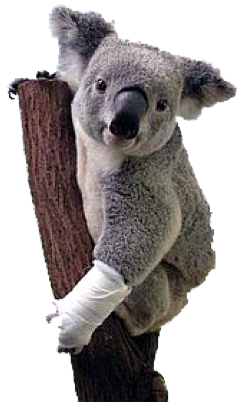Emergency Care
1. Always be careful when approaching a native animal, particularly when injured. Keep well away from any animal that may be venomous or dangerous, especially snakes1, goannas, flying foxes or other kind of bat.
• If bitten by a snake, please refer to the article on First Aid for Snakebite.
• If bitten or scratched by a bat (incl. flying fox), wash the wound with soap and water for five minutes and seek medical advice immediately.
2. Ensure the safety of the animal so that it will not sustain (further) injury.
• Depending on circumstances, this may involve removing cats and dogs from the area, removing an animal from a road, simply putting it in a box or placing a washing basket over it.
3. Do NOT feed an animal food or water, particularly if injured, except when following advice by an experienced person.
4. If practicable, keep an injured animal warm by wrapping it in a towel or blanket and placing it in an escape-proof container with airholes; place the container in a quiet, dark place2.
5. If an animal is injured and it is practicable to do so, take the animal to a vet as soon as possible.
• Vets rarely charge for attending to a native animal in need.
• Ensure that the vet records the exact location where the animal was found.
6. In the case of a dead marsupial (e.g. kangaroo or wallaby, possum, koala etc), remember that its pouch may contain a live joey or joeys.
• Never forcefully remove a joey from its teat. Wrap the mother and joey in a blanket to keep warm until help arrives.
• If it is not possible to wait until a rescuer arrives, mark the spot with coloured tape or a plastic shopping bag tied to a tree or post and inform the Wildlife Rescue phone coordinator. Alternately, text the GPS coordinates to the coordinator.
FURTHER NOTES:
• Stress caused by contact with humans or pets (especially when combined with shock resulting from injury) can easily result in the death of an animal. Contact with humans and pets must be minimised.
• If an otherwise healthy young bird is found on the ground, do not conclude it needs rescuing. Its parents may still be looking after it.
• A dead flying-fox, hanging on power lines, may have a baby hidden in the folds of its mother’s wings; it may survive for days before eventually dying of starvation.
1. If possible, watch the snake from a safe distance. Once a snake has disappeared, it can be very difficult to find.
2. In cool weather, warmth can be provided by putting warm water (NOT hot) in a plastic bottle and wrapping it in a teatowel.
